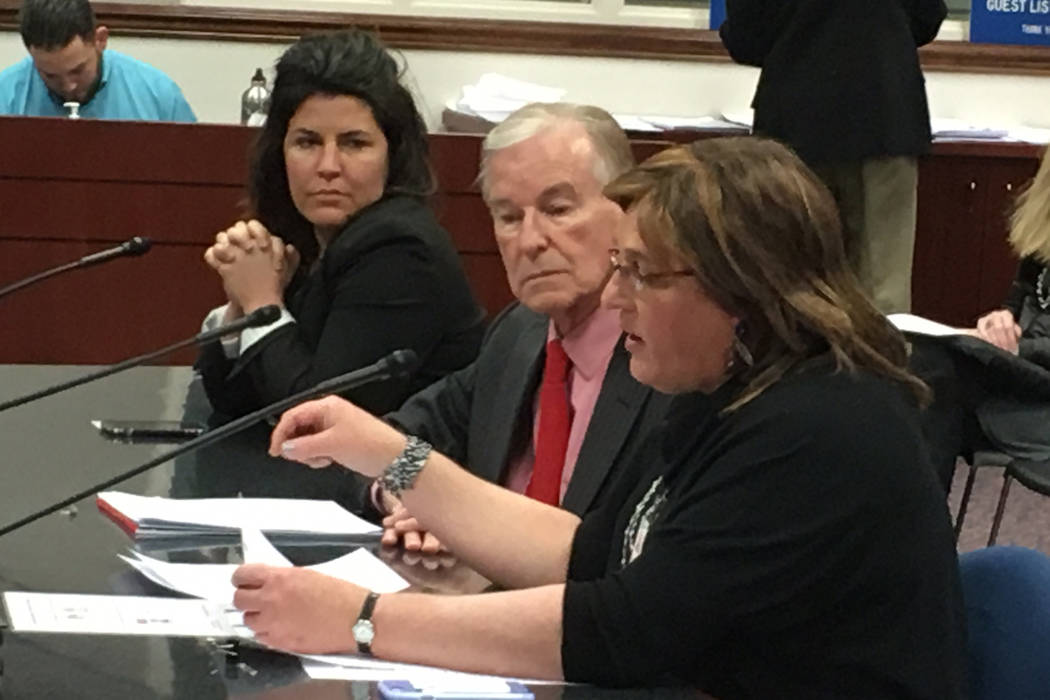Nevada’s death with dignity bill passes state Senate, but faces uncertain future with Gov. Brian Sandoval
Nevada’s “death with dignity” bill has never been a partisan issue.
In 2015, when Las Vegas Democratic state Sen. David Parks introduced the measure, it had two Republican co-sponsors: Sens. Ben Kieckhefer of Reno, and Patty Farley of Las Vegas.
This year, Farley changed her party registration to non-partisan, and caucused with Democrats. But she still co-sponsored the bill, which would allow a patient whom two doctors have given a terminal diagnosis and six months to live the option of requesting that a physician prescribe a lethal dose of drugs meant to bring about an early death.
Kieckhefer, too, signed on again as a co-sponsor. But after the Senate’s Health and Human Services Committee approved the bill and it finally came to the floor, he said he’d changed his mind and voted no. According to Kieckhefer, the hearings had raised questions about the bill that made him uncomfortable supporting it. Specifically, Kieckhefer said, he didn’t trust doctors to accurately estimate how long a person has to live.
In fact, that was one of the key arguments against the measure, made by Boulder City Republican state Sen. Joe Hardy, a medical doctor, and many of the opponents of the legislation: They cited examples of people given just months to live, who were still alive years later.
But even if Kieckhefer changed his mind about the bill, the final vote was bipartisan.
State Sens. Mo Denis and Aaron Ford, both D-Las Vegas, voted no. (A spokesman for Ford said he simply opposed the idea.) But state Sen. Pete Goicoechea, R-Eureka, voted for it. He said a planned death with the assistance of a doctor was a better option than a gunshot or a hose connected to the exhaust pipe of a car. Goicoechea said he’d known sick people who took those options rather than face a lingering, painful death.
Parks’s measure — Senate Bill 261 — is now awaiting action in the Assembly’s Health and Human Services Committee. Gov. Brian Sandoval’s spokeswoman has said the governor disagrees with the policy. So even if approved, the bill may face a veto.
Under the bill, a patient would have to ask twice for the lethal prescription, and if doctors had doubts about the patient’s mental state, they could order a psychological exam. A physician would have to meet alone with the patient to ensure he or she was not being coerced into making the decision.
And there’s a provision allowing doctors, medical facilities and pharmacists who object to the practice to decline to participate.
For opponents, the objections range from the ethical to the religious. Doctors against the bill said at a news conference in April that they took an oath to heal patients and do no harm. Hardy, during debate on the bill, contrasted euthanizing animals with doing the same to humans by saying his faith teaches humans are in charge of animals, but God is in charge of humans.
Some senators tearfully recounted stories of loved ones who suffered from the effects of illness or injuries from war before they died. Sen. Nicole Cannizzaro, D-Las Vegas, said her ill father wouldn’t have chosen to end his life earlier, but that she could understand why someone else would make the choice to avoid the suffering her father faced at the end of his life.
The pain that was evident on the floor of the Senate this week — and that’s replicated in hospitals, hospices and homes all across the state and the nation every day — underscores how wrenching and awful the decisions are that must be made as someone approaches the end of his or her life. Whether Republican or Democrat, man or woman, young or old, believer or atheist, rich or poor, none of us cares to contemplate our own demise, let alone the deaths of our loved ones, especially if those deaths are painful and accompanied by suffering.
That kind of demise is enough to test the faith and the most deeply held beliefs of anyone.
Contact Steve Sebelius at SSebelius@reviewjournal.com or 702-387-5276. Follow @SteveSebelius on Twitter.






















